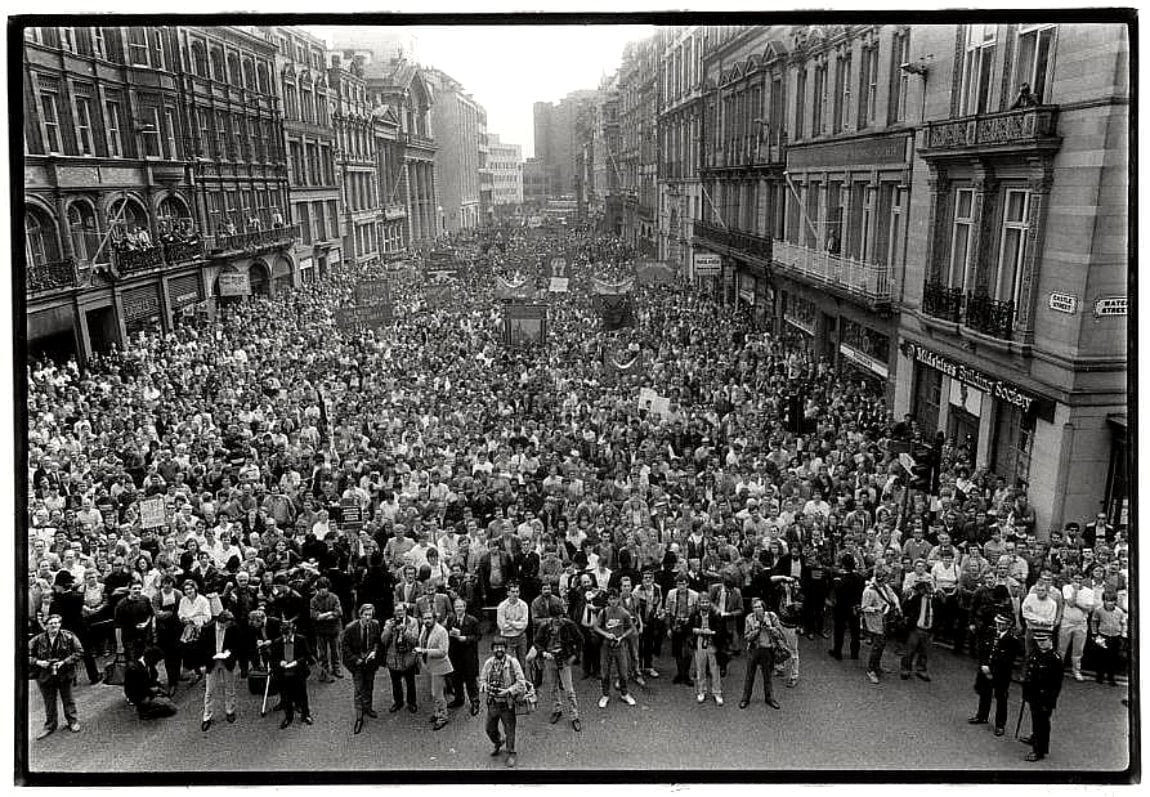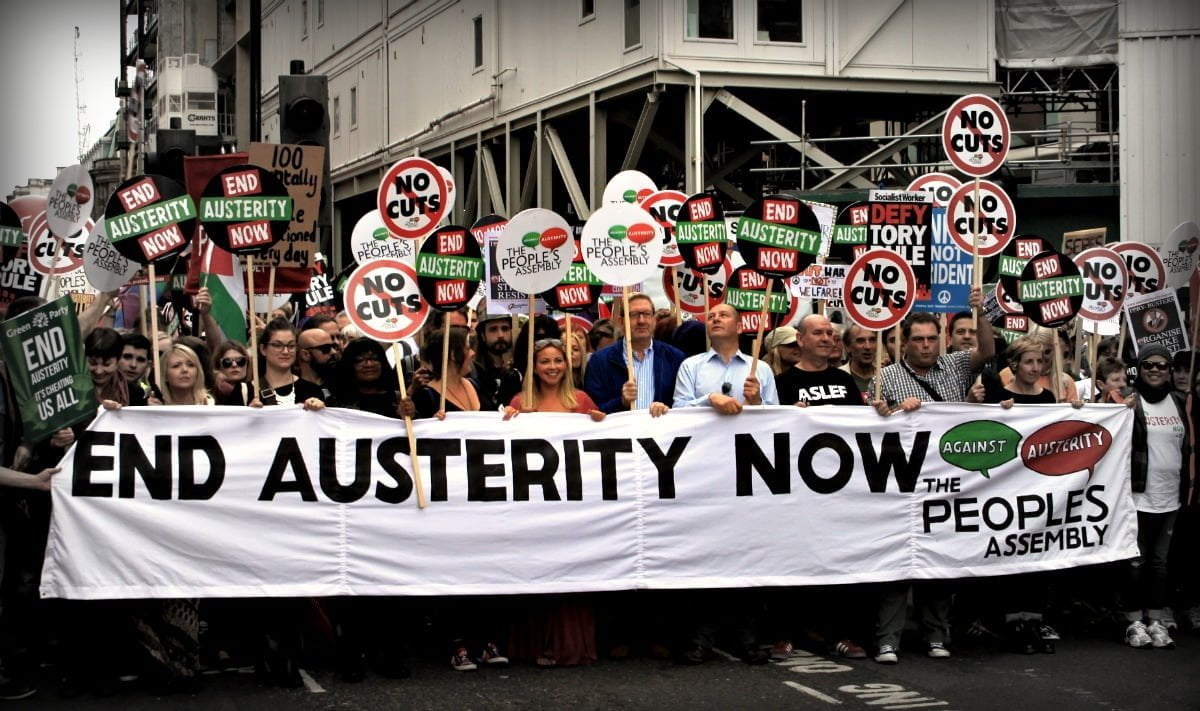Since 2010 local councils have seen their funding cut by around 30% and the Tories plan to cut it by a further 56% over the next five years. Sam Ashton discusses the crisis facing local government and the need for Labour councillors to lead the fightback against austerity.
Over the course of this month, local authorities across Britain are going through the annual process of setting their budgets for the coming year. In 2016, as in every year since 2010, the budgets decided up and down the country have resulted in significant cuts to spending, regardless of the political party nominally in control.
This is because, along with welfare, local government has borne the brunt of the Tories’ slash-and-burn programme of austerity. Since 2010 local councils have seen their funding cut by around 30% and the Tories plan to cut it by a further 56% over the next five years. These cuts have in reality been much bigger in working class areas, which have larger populations and more reliant on council services. As with all cuts, the reality is that workers are being made to pay for a crisis they didn’t cause.
Cut to the bone
Over the past five years councils have sought to make so-called ‘easy’ cuts to non-essential services – although they weren’t so easy for the thousands of local government workers who have lost their jobs. But now, with even bigger funding cuts on the horizon, the reality is there are no ‘easy’ cuts left and essential services will have to suffer.
Those services that working class families depend on, such as children’s centres, youth services, libraries and adult social care, are now threatened with closure as billions of pounds of cuts are implemented. The planned cuts are so draconian that they have produced disquiet in the ranks of the Tory party – even Cameron’s own mother and aunt joining a campaign against the closure of 44 children’s centres in their Oxfordshire home!
As a result, dozens of Tory MPs threatened to rebel and vote against the Local Government Finance Settlement, but they were quietly bought off by the offer of an extra £300 million in funding. Unsurprisingly, 83% of these extra funds will find their way to Tory-run councils. The naked class interests of this government for the rich could not be more apparent.
The ‘dented shield’
But now that we have a Labour leadership committed to fighting austerity, what is going to happen in the 110 Labour-controlled councils?
The sad fact is that they too will continue to implement cuts. In the London borough of Lambeth, the Progress dominated council are proposing to close half their libraries and make up to 500 redundancies across the council. Meanwhile in neighbouring Southwark, the council have proposed a 73% cut in their youth services budget, which would result in the loss of more than a 100 jobs. Similar swingeing cuts are being implemented by Labour run councils across the country.
These councillors argue that given the law they have no choice but to implement the cuts and adopt a legal budget, otherwise Tory appointed commissioners will be sent in to enforce the required reduction in spending.
This is essentially the same line put forward by former Labour leader Neil Kinnock in the 1980s. In the face of Thatcher’s destructive cuts, Kinnock argued that Labour councils should obey the law at all costs so that they could keep the Tories out, using a ‘dented shield’ to protect the most important services.
It was a failed strategy then, and we can expect no better success from the ‘dented shield’ approach now. How can you persuade working people to come out and vote Labour when they’re suffering at the hands of Labour implemented austerity? It didn’t help Labour win in 1992 or 2015, and it won’t help in 2020. Meanwhile, workers suffer the consequences.
Corbyn’s contradictions
 As things stand, both Jeremy Corbyn and Shadow Chancellor John McDonnell have unfortunately chosen to endorse this strategy, giving their backing to Labour councillors who are implementing cuts. In a contradictory letter to Labour council leaders in December last year, Corbyn and McDonnell, along with Shadow Communities and Local Government secretary John Trickett, insisted that councils should adopt legal, balanced budgets. In the context of the government’s draconian funding reductions, this will inevitably mean implementing cuts.
As things stand, both Jeremy Corbyn and Shadow Chancellor John McDonnell have unfortunately chosen to endorse this strategy, giving their backing to Labour councillors who are implementing cuts. In a contradictory letter to Labour council leaders in December last year, Corbyn and McDonnell, along with Shadow Communities and Local Government secretary John Trickett, insisted that councils should adopt legal, balanced budgets. In the context of the government’s draconian funding reductions, this will inevitably mean implementing cuts.
At the same time, the letter says that Labour is now an explicitly anti-austerity party that aims to ‘build a national campaign…to expose the devastating impact of this government’s cuts to local council spending’. Meanwhile, the Labour leaders state that they:
‘…wish to work with Labour Councils in forging strong alliances with local community campaigners, council staff who are under duress as a result of Tory spending cuts, local citizens and others in defending local services.’
But what if those same local community campaigners and citizens are trying to defend their services from Labour councillors intent on cutting them? What if council staff are under duress because their jobs are at risk from Labour implemented austerity?
John McDonnell has said that Labour will now support workers in struggle as a matter of principle, but what if those workers are striking against a Labour-run council planning to cut their jobs? Which side will John take then?
‘Distain and mutiny’
The reality is that a large section of Labour councillors are totally opposed to Corbyn’s leadership and Labour’s new anti-austerity position. Over the years, the ranks of Labour councillors who are dedicated class fighters have been steadily thinned, to be replaced by a cabal of right-wing careerists. This was reflected in the fact that less than 500 of Labour’s 7,000 odd elected councillors supported Corbyn’s leadership campaign.
Blairite commentator Luke Akehurst even described the attitude of councillors towards Corbyn as‘somewhere on a spectrum between disdain for the leadership and open mutiny’. The overwhelming majority of Labour Party members and supporters, however, voted decisively against austerity in electing Corbyn. Labour councillors, therefore, will have to start to reflect this new anti-austerity mood in the Party, or be replaced with ones who will.
The question that must be posed to those Labour councillors is: when it comes to implementing cuts, where do they draw the line? When does the ‘dented shield’ cease to be a shield at all? And at what point do they stop wringing their hands while faithfully passing on the cuts and instead start to fight back?
It is abundantly clear that the Tories are intent on the wholesale destruction of local government as we know it. How could it be otherwise in the face of 80% cuts? Are Labour councillors going to carry on cutting away till there’s nothing left, or are they going to fight to defend the interests of those working class people that elected them?
A history of struggle
Labour councillors have a proud history of struggle in defence of their communities: from the Poplar rates rebellion in 1921, when George Lansbury declared it was ‘better to break the law than to break the poor’; to the Clay Cross councillors refusal to implement the Housing Finance Act in 1972; and the valiant struggle of Liverpool in 1984-5. It is these struggles that show the way forward in the fight against austerity, not the discredited tactic of the ‘dented shield’.
Those workers and poor across the country suffering at the sharp end can’t afford to wait for a Labour government – they need an end to austerity now.
The fight against austerity and the fight for a Labour government are one and the same. If Labour councils across the country were to refuse to implement cuts, and instead build resistance in their communities, this could act as a focal point for the creation of a truly mass movement against the Tories and austerity. In the face of millions of workers aroused to struggle, what power would the Tories have to bring councils to heel?
We fully support and will fight for a Labour government. But we also stress that a Corbyn-led government must base itself on a socialist programme, including taking over the main levers of the economy – such as the banks and the major monopolies – under democratic workers’ control. In the context of capitalist crisis, there is no other way to restore those services and jobs that have been destroyed and undo the damage inflicted by years of austerity.
The Labour Party was formed by the trade unions to fight for the interests of working people. We once again have a Labour leader committed to fighting for those same interests. Now we must fight to ensure that we have elected representatives at every level that share that commitment – a leadership that is willing to struggle for a socialist alternative.

Workers and youth come out in support of Liverpool City Council in 1985 (photo by Dave Sinclair)






